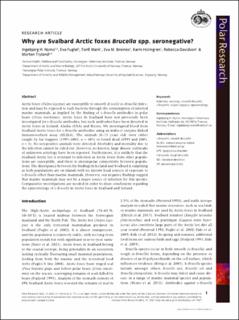Why are Svalbard Arctic foxes Brucella spp. seronegative?
Nymo, Ingebjørg Helena; Fuglei, Eva; Mørk, Torill; Breines, Eva Marie; Holmgren, Karin Elisabeth; Davidson, Rebecca K.; Tryland, Morten
Peer reviewed, Journal article
Published version
Permanent lenke
https://hdl.handle.net/11250/3034531Utgivelsesdato
2022Metadata
Vis full innførselSamlinger
Sammendrag
Arctic foxes (Vulpes lagopus) are susceptible to smooth Brucella (s-Brucella) infection and may be exposed to such bacteria through the consumption of infected marine mammals, as implied by the finding of s-Brucella antibodies in polar bears (Ursus maritimus). Arctic foxes in Svalbard have not previously been investigated for s-Brucella antibodies, but such antibodies have been detected in Arctic foxes in Iceland, Alaska (USA) and Russia. We investigated blood from Svalbard Arctic foxes for s-Brucella antibodies using an indirect enzyme-linked immunosorbent assay (iELISA). The animals (0–13 years old) were either caught by fur trappers (1995–2003, n = 403) or found dead (1995 and 2003, n = 3). No seropositive animals were detected. Morbidity and mortality due to the infection cannot be ruled out. However, no known, large disease outbreaks of unknown aetiology have been reported. Furthermore, it is unlikely that the Svalbard Arctic fox is resistant to infection as Arctic foxes from other populations are susceptible, and there is circumpolar connectivity between populations. The discrepancy between the findings in Iceland and Svalbard is surprising as both populations are on islands with no known local sources of exposure to s-Brucella other than marine mammals. However, our negative findings suggest that marine mammals may not be a major source of infection for this species. Comparative investigations are needed in order to draw conclusions regarding the epizootiology of s-Brucella in Arctic foxes in Svalbard and Iceland.
Beskrivelse
© 2022 I.H. Nymo et al. This is an Open Access article distributed under the terms of the Creative Commons Attribution-NonCommercial 4.0 International License (http://creativecommons.org/licenses/by-nc/4.0/), permitting all non-commercial use, distribution, and reproduction in any medium, provided the original work is properly cited.

